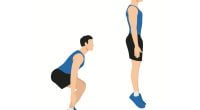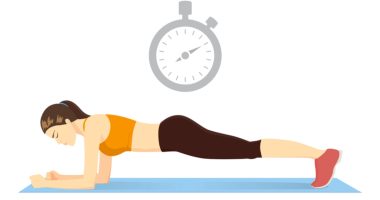7 Unhealthy Lifestyle Habits That Are Destroying Your Back as You Age – There are so many habits you may have that negatively impact your back health. Some of them may really surprise you. We did some digging, and you’ll want to listen carefully to these unhealthy lifestyle habits that destroy your back as you age.
According to WebMD, what you eat, wear, and sleep on can compromise your back health—and that’s not all. Did you know that choosing the wrong bike size or wearing a bra too high and tight can actually cause back problems? Slouching over the steering wheel when driving is also a terrible habit. So shoulders up, and read on to learn what you may be doing wrong on a daily basis, and next, don’t miss The 5 Exercises You Should Be Doing at the Gym for Weight Loss
1. You’re not maintaining a healthy diet.

Most individuals associate unhealthy eating with weight gain and developing chronic health issues. But making the wrong food choices can cause inflammation and also result in unwanted weight gain. According to WebMD, you need certain nutrients to build up your strength, such as vitamin D, calcium, and phosphorus. Every individual requires fresh veggies, fruits, whole grains, and lean protein in their diet.
Obesity can also wreak havoc on your back, the Mayo Clinic explains. Practicing healthy lifestyle habits and maintaining the correct weight for your age and height can help you avoid added stress and pressure on your back.
2. You’re not sleeping correctly.

Believe it or not, the position in which you sleep and what you sleep on are both quite important. If you prefer sleeping on your stomach, using a super soft pillow or no pillow can be helpful, WebMD explains. And if you’re a back sleeper, you may benefit from using a pillow underneath both knees to maintain your back’s natural curvature. It’s also a smart idea to select just the right pillow height and mattress firmness that supports your head and back.
According to Casper, your mattress can totally be the root of your back problems if you have back pain in the morning when you get up, you’re unable to find a comfortable position when sleeping, or you keep waking up at night.
3. You’re a smoker.
Surprisingly, if you’re a smoker, you triple your chances of suffering from pain in your lower back, WebMD points out. Smoking can decrease your body’s flow of blood, and that includes the blood flow to your spine. This can make your bones weaker, resulting in osteoporosis. Plain and simple, smoking is terrible for your back and overall health.
4. You’re not using good form when running.

Getting your fill of aerobic exercise provides so many benefits to your health. However, getting in those strides can lead to pain in your lower back from straining your muscles, curving your spine, and suffering from a herniated disk, Spine Institute of North America reports. Lower-back pain often has to do with spinal discs. When you head out for a run, your spinal discs take in the shock as your body goes up and down with each stride. Your spinal discs have the potential to cause pain and decay as you age.
5. You’re not doing the “McGill Big 3” during workouts.
For some inspiration during your next workout, we spoke with Tyler Read, the founder of PTPioneer.com and a personal trainer who has been involved in health and fitness for the past 15 years, who recommends the “McGill Big 3” as his exercises of choice to boost your back health. “The McGill Big 3 help substantially with spinal stability. Lack of stability can contribute to low back pain (although the cause of back pain will ultimately determine which exercises/approaches are most appropriate, per a licensed PT). I have had better luck relieving low back pain with these than I have with stretching, foam rolling, etc on many clients as well as myself,” Read tells us.
The “McGill Big 3” include side planks, bird dogs, and modified curl-ups. (For the modified curl-ups, you’ll lie down on your back, extend one leg, and bring the other knee up with that foot planted on the floor. Put both hands under your tailbone, and raise your shoulders around an inch off the floor, maintaining a tucked chin.)
“Exercises to avoid would primarily be standard situps, as the risk-reward tradeoff just is not there,” Read explains. “Also, anything that triggers low back pain during movement should be avoided.”
6. You’re sitting with your legs crossed.
If you’re crossing your legs or have your foot underneath your butt right now, stop immediately! Both of those positions can cause your pelvis to tilt, overworking your spine, according to the Comprehensive Spine Institute. Your shoulder may feel discomfort as an early sign, but performing this habit continuously is simply bad for your back, so ditch the criss-cross applesauce form ASAP.
7. You’re not moving your body efficiently or enough.

A sedentary lifestyle is a bad one, and unfortunately, it’s become incredibly common nowadays when working from home and desk jobs are more prevalent. Having bad posture or not moving around enough can contribute to back issues. It’s important to avoid slouching and sit with solid posture. A supportive chair is crucial for a desk job.
Something as simple as not keeping your cell or wallet in your pants back pocket can help you avoid added pressure on your lower back, according to the Mayo Clinic. In addition, if you consecutively perform awkward movements that cause your spine to rotate or twist, you may create a back injury for yourself.









